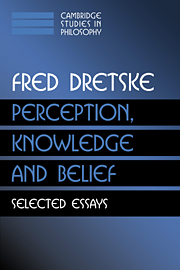Book contents
- Frontmatter
- Contents
- Preface
- Part One Knowledge
- Part Two Perception and Experience
- Part Three Thought and Intentionality
- 11 Putting Information to Work
- 12 If You Can't Make One, You Don't Know How It Works
- 13 The Nature of Thought
- 14 Norms, History, and the Constitution of the Mental
- 15 Minds, Machines, and Money: What Really Explains Behavior
- Index
13 - The Nature of Thought
Published online by Cambridge University Press: 19 December 2009
- Frontmatter
- Contents
- Preface
- Part One Knowledge
- Part Two Perception and Experience
- Part Three Thought and Intentionality
- 11 Putting Information to Work
- 12 If You Can't Make One, You Don't Know How It Works
- 13 The Nature of Thought
- 14 Norms, History, and the Constitution of the Mental
- 15 Minds, Machines, and Money: What Really Explains Behavior
- Index
Summary
A state or activity is extrinsic if an agent cannot occupy this state or engage in this activity, unless there exists (or existed) some wholly distinct object. Hitting a home run, watching a sunset, and paddling a canoe are extrinsic activities. Being watched, surrounded, and ignored are extrinsic states.
If, as some of these examples suggest, this other object must be a person, a conscious being of some sort, I will say that the extrinsic state or activity has a social character. A person can be surrounded by trees or water, but you need another conscious being to be ignored or watched. Marrying, divorcing, and tangoing are also social: it takes two. Killing, kidnapping, and stealing, although not exactly sociable, are also social. You simply cannot do these things alone, without there existing (either then or at some earlier time) another conscious being. Being a father and a widow are also social in this minimal sense. Fathers must have children and widows must have had husbands.
If this is what it means to have a social character, and I do not see how anything less could qualify, then it seems plausible – nay, obvious – that language has a social character. Communication, the heart and soul of language, requires senders and receivers. Without a set of reciprocal intentions and agreements, without a network of shared conventions that confer meaning on our acoustic productions, nothing we do counts as saying anything.
- Type
- Chapter
- Information
- Perception, Knowledge and BeliefSelected Essays, pp. 227 - 241Publisher: Cambridge University PressPrint publication year: 2000



